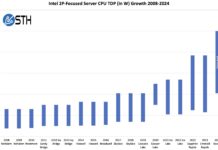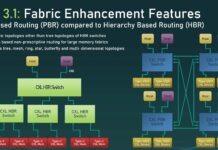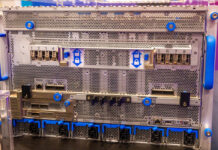Inspur AI Portfolio Growth at IPF 2019
Inspur had a number of announcements adding to its AI portfolio at IPF 2019. We wanted to focus on a few key points beyond its GPU servers which we have largely covered in previous articles as in our Inspur AGX-5 and Our SC18 Discussion with the Company piece and our Inspur Systems NF5468M5 Review.
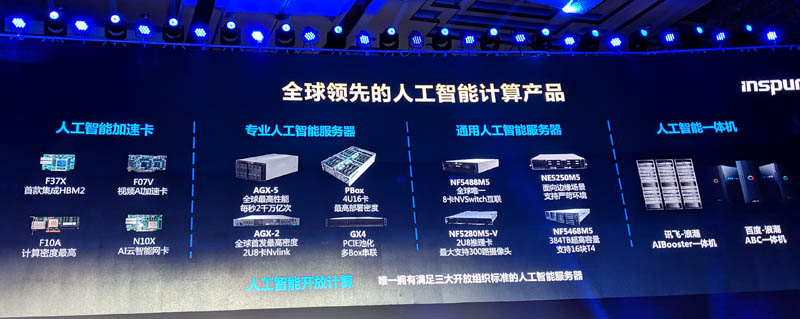
Another area that it was clear that Inspur was moving into was FPGA acceleration. At IPF 2019, the company showed off a number of advancements in the space. Through its JDM model, requirements from customers have been around using FPGAs for applications like network processing, video processing, and AI inferencing. An example of this is Inspur’s TF2 acceleration using FPGAs.
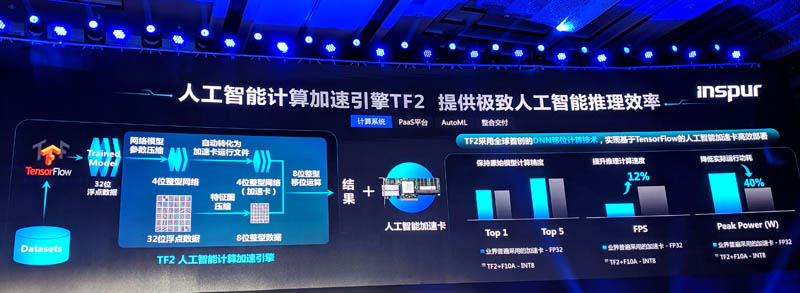
Inspur now has a portfolio of PCIe cards with FPGAs. We are told the company also has teams of FPGA engineers building logic for customers. This is a contrast again to other server vendors who tend to rely on partner boards and logic as we discussed in our Intel Agilex Launched and Takeaways from a Discussion with Dan McNamara article recently.
Two examples of this diversity are the Arria 10 based Inspur F10A acceleration card using Intel’s Arria line:
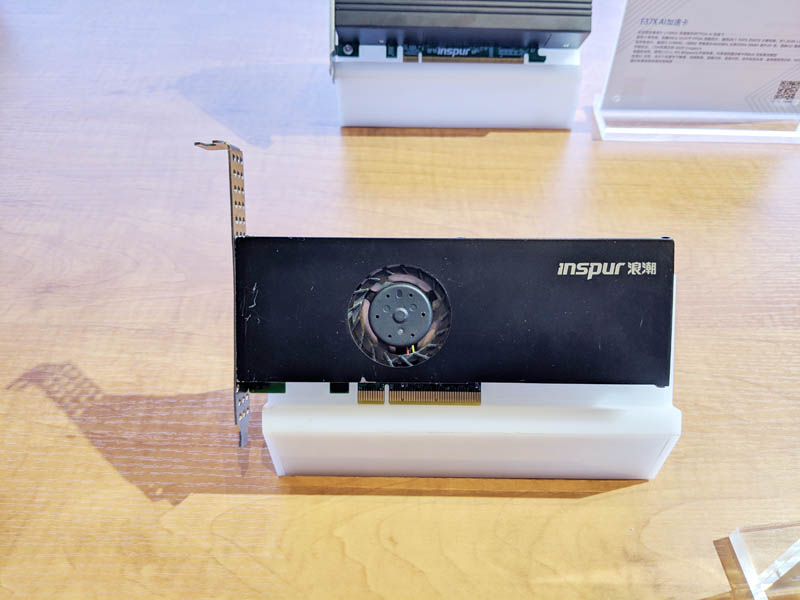
Inspur also had its F37X accelerator which includes a Xilinx FPGA as well as onboard HBM2 for ultra-fast memory access.
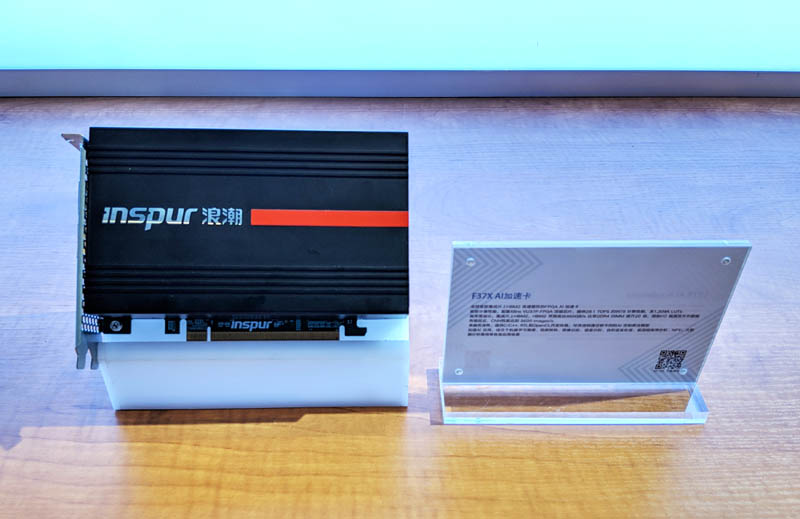
Overall, Inspur is moving in the direction of building a line of FPGA products for its CSP customers like Baidu, Alibaba, and Tencent that other industries and customer segments are starting to use from its portfolio. The company sees CAGR for accelerated computing including FPGAs and GPUs to be much higher than CPU-based computing growth. As a result, one can see the heavy investment that the company is putting in these areas.
Inspur has also been investing in its AutoML suite. This is a set of tools that help automate the process of generating useful models. Inspur is expanding the suite and using it to help customers quickly deploy AI into their applications.

The Inspur AutoML Suite is just one prong of the new initiative called Inspur Brain that aims to bring end-to-end AI solutions to the company’s customers.

At IPF 2019, one could clearly tell that this was an area of competitive strength for Inspur as every customer success story involved how Inspur was helping them use AI and big data platforms in their environments.
Inspur Servers and InCloud at IPF 2019
At IPF 2019, the company also launched the Inspur InCloud platform. This is an OpenStack based cloud platform that offers end-to-end management including compute, network, and storage for virtualized and containerized workloads. Inspur also highlights that its InCloud platform is designed to integrate its AI acceleration for large scale customers.
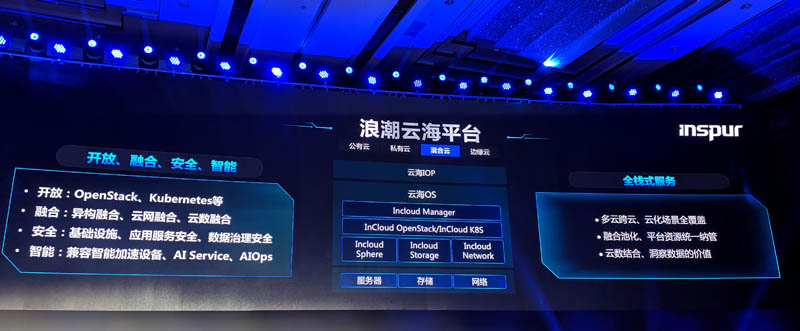
At OCP Summit 2019 and GTC 2019 we saw many of the company’s new edge computing and GPU building blocks. At IPF 2019, the Inspur Systems NF8260M5 4P server we reviewed was shown-off by Intel, OCP, and Inspur. Instead of focusing on these servers, we wanted to show off two server hardware areas at the show: cooling and 8-socket.
Inspur Liquid Cooling
As a vendor owning a dominant AI server position in the market, Inspur sees that we will have liquid cooled servers in the near future. We confirmed that the company does not currently have an Intel Xeon Platinum 9200 platform, often liquid cooled, which is a trend due to Intel’s positioning of the product. The company showed off fairly standard liquid cooling designs including 2U4N platforms cooled via liquid cooling blocks.
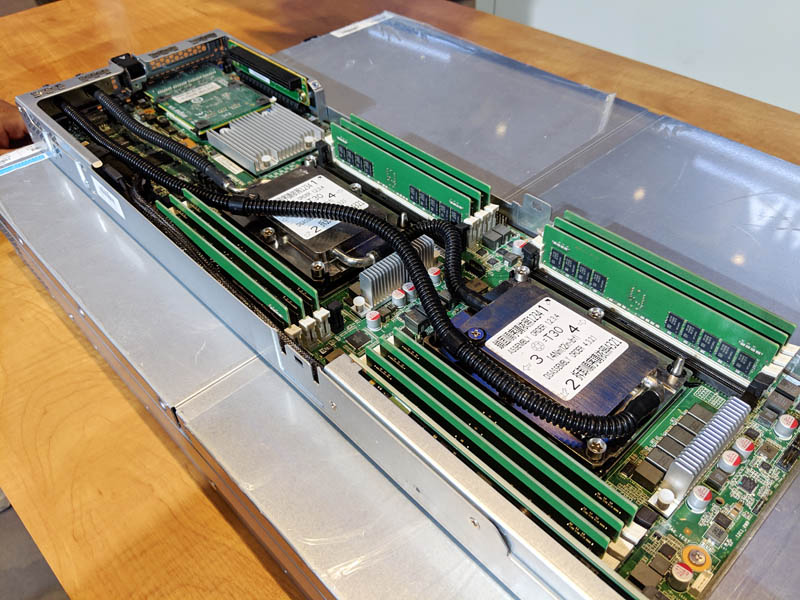
Inspur is also looking to next-generation cooling for HPC which includes its liquid immersion cooling platform. One of Inspur’s largest customers is Alibaba and we have covered Alibaba’s Immersion Cooling at Scale Research. Inspur says its customers are looking for immersion cooling as next-generation HPC chips get hotter.
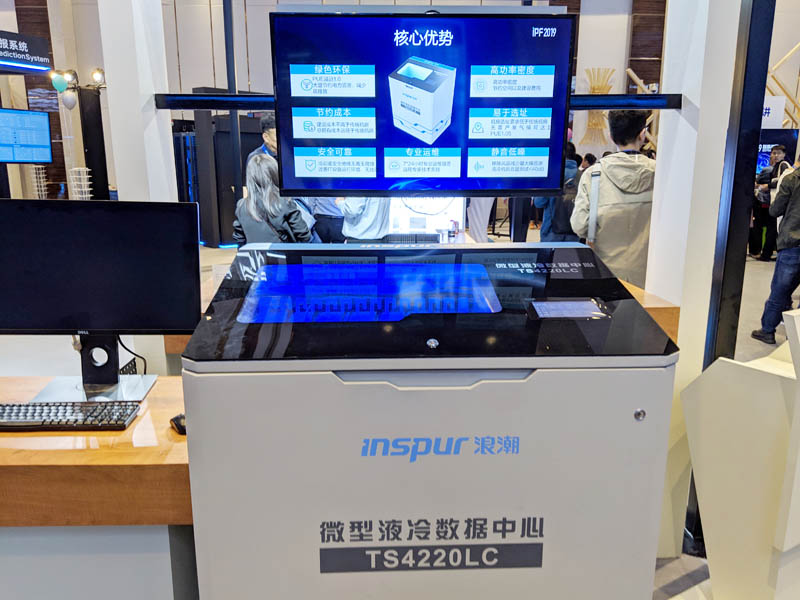
For a company pushing AI and accelerator use, the need for liquid cooling will become more important as CPUs and accelerators use more power in the near future.
Inspur TS860M5 4U8S Server
We wanted to highlight one other design that we do not see often from Dell and HPE, the Inspur TS860M5 4U 8-socket Intel Xeon Scalable platform. Inspur is fitting an 8-socket server into the same 4U that we would have expected to see 4-socket servers in just a generation ago. The Inspur TS860M5 uses the top 2U of space for power supplies, storage, cooling, and a massive I/O tray. One can see that there are two internal PCIe slots for storage controllers than a large array of low profile PCIe slots for expansion.
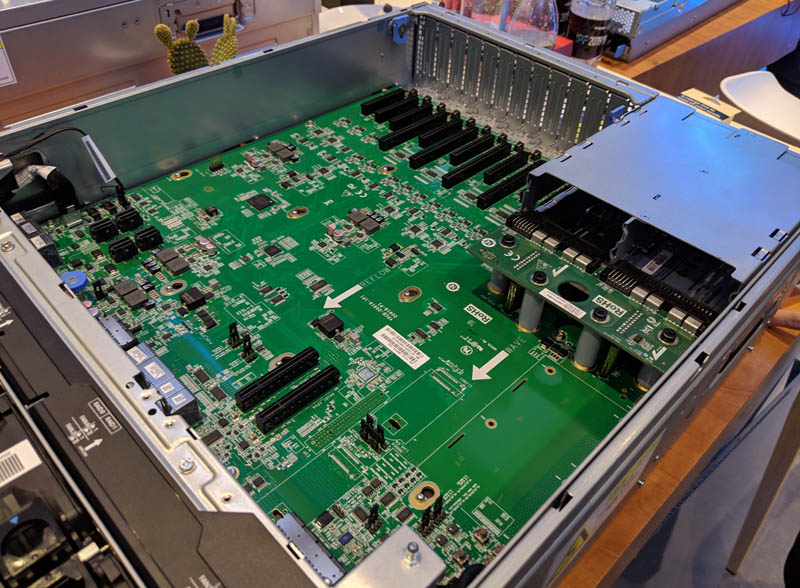
These low profile slots had an interesting feature. Press a small button at the rear of the chassis that corresponds to the PCIe slot. Doing so turns off the PCIe slot and allows the device to be removed and swapped without interrupting the host. Uptime matters in 8-socket designs and this shows Inspur is making intelligent design choices for its customers.
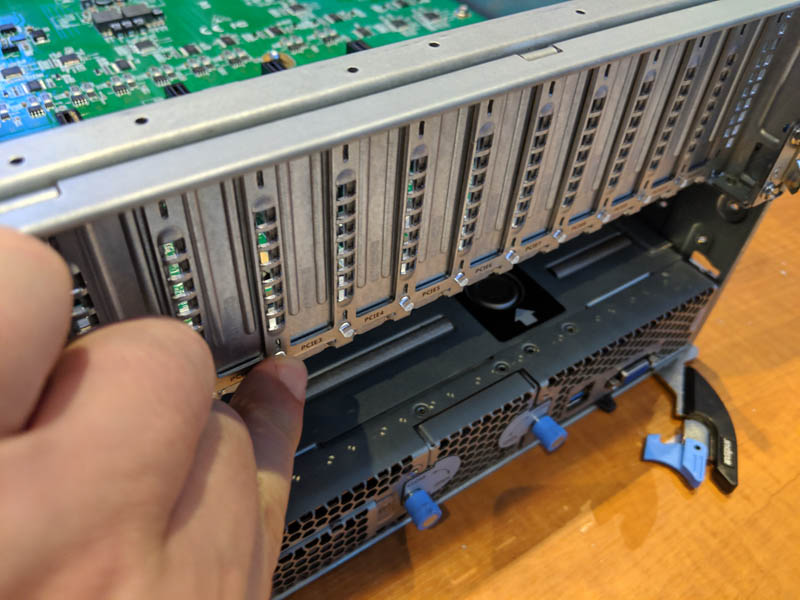
The eight processors are split to two trays of four CPUs. Each Intel Xeon Scalable (Platinum) CPU has a full 12x DIMM slots for traditional DDR4 and Intel Optane DCPMM.
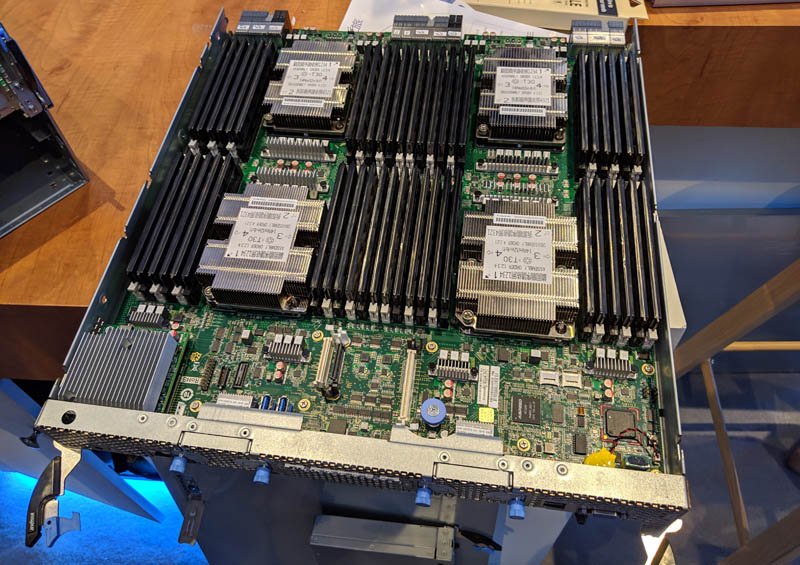
One can see features like OCP NIC ports here to lower the load on the PCIe expansion slots. By using two trays, the eight sockets are surprisingly serviceable. 8-socket servers are not popular in the US and Europe but are very popular in China. One can tell that Inspur has iterated on these designs for its customers.
Wrapping up IPF 2019 Experience
This was my first IPF 2019, but I felt that STH needed to cover the event. Inspur has a strong position with Chinese CSPs and in the AI market. The AI focus was everywhere, down to the IPF 2019 Coca-Cola cans trumpeting Inspur’s 50% market share achievement in the space.
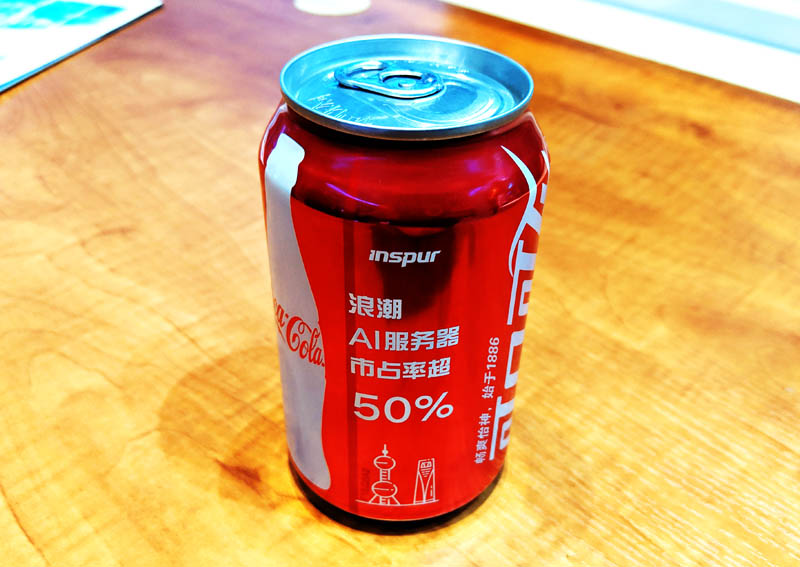
At the same time, Inspur is taking a very different approach than Dell and HPE who will have events in the coming weeks and months that STH will attend. It was a great opportunity to hear both from Inspur, as well as the IPF 2019 HPC press on the state of the company and market.

Looking forward to the next few weeks, we have two more pieces that I think the STH readers will find fascinating including an interview with Lilian Wang who is SVP of Inspur and GM of the company’s CSP segment. We also traveled to Jinan to see how the Inspur Intelligent Factory to produce high volume servers for CSPs like Baidu, Alibaba, and Tencent.

Stay tuned for more from our IPF 2019 trip on STH in the near future. I wanted to add a special thanks to our hosts from Inspur and the broader STH team including Virginia who helped me get around China and William, Cliff, John, Rohit, and Greg who kept STH running and allowed our IPF 2019 coverage to be more ambitious than it would have been without them.

